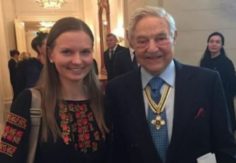Soros is helping publisher Agora SA in their take-over bid for Radio Zet, in an effort to stop Fratria, a publisher of a pro-government weekly Sieci, according to Wirtualnemedia.pl portal.
Poland is following the example of Hungary, where an anti-Soros campaign ended in the Hungarian-born billionaire’s foundation leaving the country.
On Monday, the ruling Law & Justice party spokeswoman Beata Mazurek said on Twitter: “The state should do everything to stop market speculators from increasing their influence on the media market.”
But Bloomberg reported that hours later, Deputy Culture Minister Pawel Lewandowski told wPolsce.pl television that the government does not have the legal means other than usual anti-monopoly legislation to stop the deal.
“The problem is how to measure concentration on the media market with multiple platforms and how to measure concentration on the market of ideas, we don’t have tools for that,” he said. “I’d like to have legal grounds to do it.”
The Law & Justice party has repeatedly called for a “re-Polonization” of its foreign-owned media, but after an international campaign, the government has shelved plans that could force foreign media owners out.
By imposing rules to limit ownership on groups whose cross-platform holdings and market share are deemed “dominant”, foreign media players will be at a disadvantage.
Lyudmyla Kozlovska, a young Ukrainian “human rights defender” working for Soros’s Open Dialog Foundation, has worked shoulder-to-shoulder with anti-Polish activists for the cause.
Last year, the Polish government deported Kozlovska without any explanation. The likely reason is that she and her Polish husband, Bartosz Kramek, had been instigating riots against the ruling party.
Kozlovska admitted that her husband had posted a statement on Facebook calling for civil disobedience.
When Kozlovska – who had met with Soros personally – traveled to Brussels, she was turned away at the border because Polish officials had placed an alert in the Schengen Information System (SIS), a shared EU database flagging “unwelcome” foreigners during border control.
Kozlovska and Kramek told the Washington Post that they have reason to believe that the Internal Security Agency regards them as a threat to public safety.
The Office for Foreigners, the Polish government agency responsible for foreigners who reside in the country, declined to comment on this specific case, but Polish officials had already confirmed that they made the alert, labeling her as an agent of George Soros.
Kozlovska has been an outspoken protester against Moscow’s inclusion of her former home region of Crimea. The George Soros Open Dialog Foundation called this an “act of political nature carried out by the Polish authorities in order to stop the activities of the organization in the country and abroad”.
Polish members of the European Parliament Kosma Zlotowski, Ryszard Antoni Legutko and Ryszard Czarnecki, who represent the Law and Justice (PiS) party, submitted written questions to the European Commission attempting to end the Foundation’s accreditation to the Transparency Register. But all of these have been dismissed by the European institutions as “unfounded” concerns.
Pressure from Soros-linked entities have been building on Eastern European countries to adopt an anti-Russian posture. According to the Wall Street Journal, in a meeting with US Ambassador David Cornstein, Hungarian Prime Minister Viktor Orban told the American diplomats that he refuses to pressurise China and Russia, and would rather stay neutral like Austria.
“Washington pushes for a tougher line on Russia and China, deepening fears that a longtime American ally is drifting from its orbit,” WSJ opined.
A senior Hungarian official told WSJ that the prime minister strongly objects to US pressure aimed at curbing the influence of Moscow and Beijing in Europe. “The point for Orban is, yes, we want to do business with Russia,” the senior Hungarian official said. The prime minister also made it clear that he does not want to be lectured about how to deal with China.
In recent weeks, the US has sought to rally fellow NATO members for months to step up its backing for Ukraine in the country’s running confrontation with Russia as well as to take firmer steps to counter alleged Chinese cyber-espionage.
Orban has resisted both moves, and like many other European leaders, has invited Chinese investment in his country’s internet infrastructure.
Moreover, Orban has been blocking NATO from holding ministerial talks with Ukraine because, his government says, “he wants Ukrainian schools to offer more classes in Hungarian for the country’s Hungarian-speaking minority,” the WSJ noted.
According to US government sources, US Secretary of State Mike Pompeo is planning to visit Orban in February. The sources also maintained that Orban is too close to Russia, and in Washington he is therefore deemed not trustworthy.












